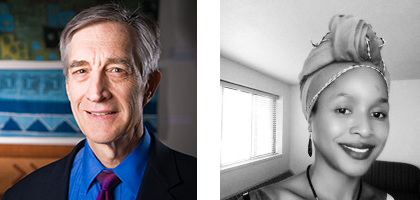Faculty voice: Building peace together in a time of remote learning
Stephen Esquith and Weloré Tamboura examine the recent coup in Mali and how MSU's efforts have helped build peace.
Stephen L. Esquith is the dean of the Residential College of Arts and Humanities.
Weloré Tamboura is a visiting professor and language fellow in the Residential College of Arts and Humanities and assistant professor at the Université des Lettres et des Sciences Humaines de Bamako, Mali.
On August 18, elements of the Malian Armed Forces mutinied against President Ibrahim Boubacar Keïta. The soldiers detained several government officials and Keïta dissolved the government and the Parliament. This is Mali’s second coup in less than 10 years, following the 2012 coup d’état.
The respected Afrobarometer quickly noted that a sizable number of citizens favor a return to civilian rule: “Even if many citizens appear willing to accept military intervention in the short term, they reject military rule as a system of government.” Although it will take time and help, there is good reason to believe that the old mole, democratic government, will resurface.
MSU has been a committed partner to democratic and economic development in Mali since the early 1990s, when Malians elected their first president after 30 years of independence from French colonial rule. Neither democracy nor human security have come easy to Mali, despite extraordinary efforts by its diverse population of now 16 million. But MSU has stayed the course.
Partnerships have to be reciprocal and sustainable, and MSU’s partnerships in Mali have maintained this dual focus, beginning with the MSU College of Agriculture and Natural Resource’s Food Security Group in the 1980s, which remains engaged in Mali today and, since 2013, with the Residential College in the Arts and Humanities’ Peacebuilding Project in Mali. Benefits have flowed in both directions, and MSU’s traditional commitment to the long haul has not wavered. As the world wrestles with COVID-19 and Malians struggle to restore democratic political order once more, MSU continues to stay connected, albeit remotely for the moment, so that peacebuilding can continue.
The latest coup in Mali will likely lead to a transitional government before new elections can be organized. During this time, different factions will vie for power and international forces will exert their influences. The effects of coups like this are hard to predict. One thing we feel confident in is that the partnerships that MSU has forged will weather this storm and the long process of peacebuilding will continue toward a more positive peace.
An absolutely crucial element in the RCAH Peacebuilding Project has been the unwavering support of the MSU Alliance for African Partnership. Since 2017, the AAP has provided funding for collaborative peacebuilding projects with Malian partners, including the Université des Lettres et des Sciences Humaines de Bamako. We have developed new reading materials, experiential educational programs and an effective video animation hosted by MSU’s program Scientific Animation Without Borders. Last year we were approached by the Malian Commission for Truth, Justice, and Reconciliation to raise awareness of the need for reconciliation and reparations.
In addition, AAP has sponsored RCAH’s first post-doctoral fellow, Dr. Tamboura, who has participated in a wide range of activities in the college beyond the peacebuilding projects mentioned above, such as our Cultures and Languages across the Curriculum program, our community engagement program and several RCAH courses.
RCAH’s work in Mali is part of a larger RCAH initiative, the Network for Global Civic Engagement. With support from the Network and AAP, we have been able to share our strategies for peacebuilding throughout the world. Peacebuilding in Mali has helped others in the Network better understand their own projects for sustainable human development.
The current political instability in Mali reminds us that peacebuilding is always a process. As some problems are solved, new ones arise. What is needed is a strong network of partners who share a common vision. MSU is helping to keep that common vision alive by working side-by-side with equally committed partners like those in Mali who have known adversity and stepped up to meet it. Reciprocity is not a slogan for these partnerships and alliances. It is real — even in a virtual environment.
